Fiat 500 VS Toyota Aygo
In the battle of compact city cars, the Fiat 500 and Toyota Aygo each bring their own distinctive flair and practicality to the table. The Fiat 500 impresses with its retro styling and customizable options, appealing to those seeking a fun and fashionable ride. Meanwhile, the Toyota Aygo stands out for its reliability and fuel efficiency, making it an ideal choice for urban drivers looking for a no-nonsense solution to city commuting.
Fiat 500
The Fiat 500 is a compact and stylish city car that has captured the hearts of urban drivers with its charming retro design. Its nimble handling and efficient engine make navigating tight city streets a breeze, while its cosy interior offers a surprising amount of comfort and modern technology. The car's iconic silhouette and vibrant colour options ensure it stands out, offering a unique blend of timeless appeal and contemporary flair.
detailsToyota Aygo
The Toyota Aygo presents itself as a compact city car, perfect for navigating tight urban spaces with ease. Its stylish design is complemented by a vibrant variety of colour options, making it a standout choice for those looking to express their individuality. Inside, the Aygo offers a comfortable and functional cabin, equipped with modern features that enhance the overall driving experience.
detailsFiat 500 vs. Toyota Aygo: A Clash of Urban Compacts
In the bustling world of urban commuting, compact cars have become a staple for city dwellers seeking efficiency without compromising on style. Two notable contenders in this segment are the Fiat 500 and the Toyota Aygo. While both vehicles share the same purpose of providing a nimble driving experience, their approaches differ significantly. Let’s dive deeper into their specifications, innovations, and overall driving dynamics.
Powertrains and Performance
The heart of any car is its engine, and here is where the two models diverge significantly. The Fiat 500 offers a choice of electric powertrains, delivering a punchy performance with options providing up to 118 HP. With impressive torque figures of 220 Nm, the electric variant takes just 9 seconds to race from 0-100 km/h. The electric model also flaunts a commendable range of up to 321 km on a single charge, making it perfect for urban use.
On the other hand, the Toyota Aygo is powered by a 1.0-liter 3-cylinder petrol engine capable of generating 72 HP. It may not carry the same punch as the Fiat, with an acceleration time of around 15.6 seconds from 0-100 km/h, but it compensates with practicality, offering a maximum speed of 158 km/h. Additionally, its fuel consumption rating is impressive, averaging around 4.9 L/100 km, accentuating its efficiency.
Dimensions and Practicality
When comparing dimensions, the Toyota Aygo is slightly larger, measuring 3700 mm in length, 1740 mm in width, and standing 1510 mm tall. In contrast, the Fiat 500 is more compact at 3632 mm in length and 1683 mm in width, providing a charming, retro aesthetic.
Trunk space is an essential factor for many buyers; here, the Aygo also has the upper hand with 231 L of storage compared to the Fiat’s 185 L. Both vehicles seat four passengers, but the Aygo's larger size means it may offer slightly more legroom, especially for rear passengers.
Interior and Features
Inside, the Fiat 500 is a stylish amalgamation of modern technology and classic design. The electric variants come equipped with advanced infotainment systems, including smartphone connectivity, which is essential for the tech-savvy urbanite. The interior features quality materials, lending a refined feel to the overall driving experience.
The Toyota Aygo adopts a more functional approach. Its simple dashboard layout and user-friendly controls ensure accessibility while driving. The car also boasts a solid sound system and modern infotainment but lacks some of the snazzy touches found in the Fiat 500.
Innovations and Safety
Fiat has embraced innovation with the 500’s electric drivetrain and smart driving aids, including adaptive cruise control and lane-keeping assist, reinforcing its commitment to future mobility. Additionally, its CO2 emission rating of 0 g/km is a significant selling point for eco-conscious consumers.
Meanwhile, the Toyota Aygo also includes safety features such as pre-collision systems and lane departure alerts, but it holds a CO2 efficiency class rating of 'C,' owing to its petrol engine. Toyota's durability and reliability further ensure peace of mind for daily drivers.
Conclusion: Which One Should You Choose?
Choosing between the Fiat 500 and the Toyota Aygo ultimately boils down to personal preference and driving needs. If you seek an eco-friendly, stylish vehicle for urban living, the Fiat 500’s electric variants provide a contemporary edge with superior performance. However, if you’re inclined towards practicality, reliability, and slightly more space, the Toyota Aygo appears to be the more functional option. Both cars undoubtedly embody the spirit of city driving, ensuring that whichever you choose, you're in for a rewarding experience on the road.
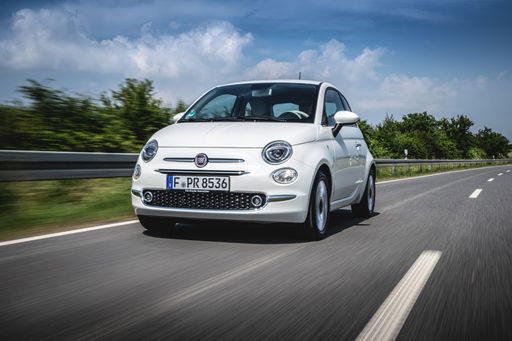 @ media.stellantis.com
@ media.stellantis.com
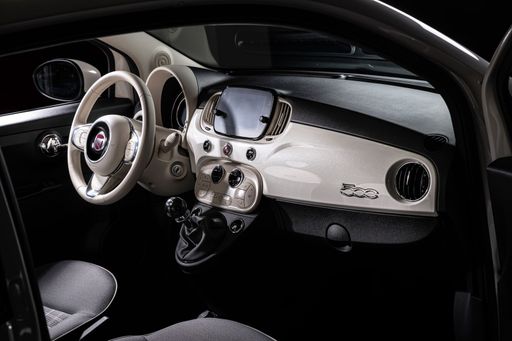 @ media.stellantis.com
@ media.stellantis.com
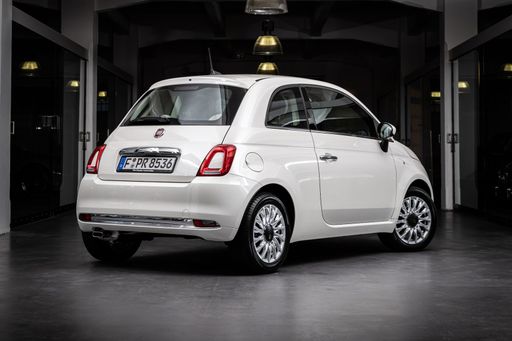 @ media.stellantis.com
@ media.stellantis.com
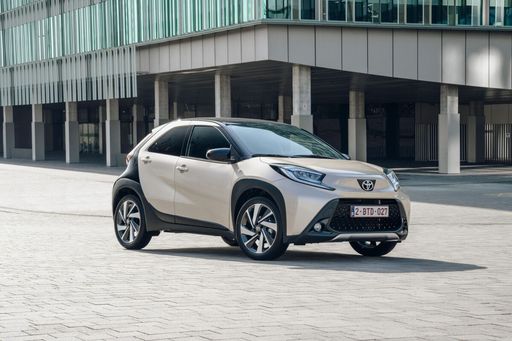 @ Toyota
@ Toyota
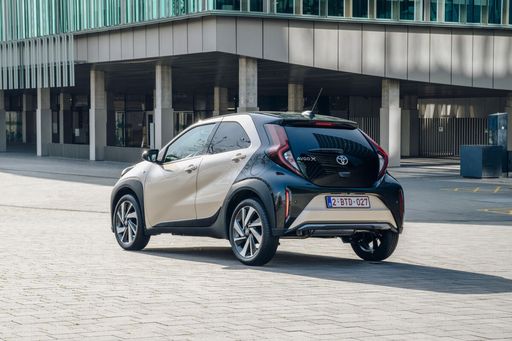 @ Toyota
@ Toyota
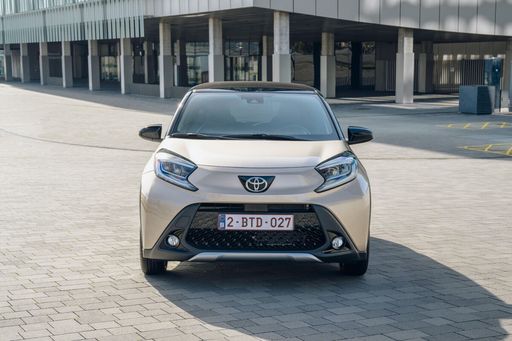 @ Toyota
@ Toyota
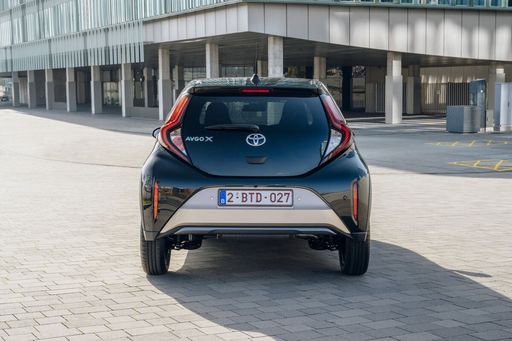 @ Toyota
@ Toyota
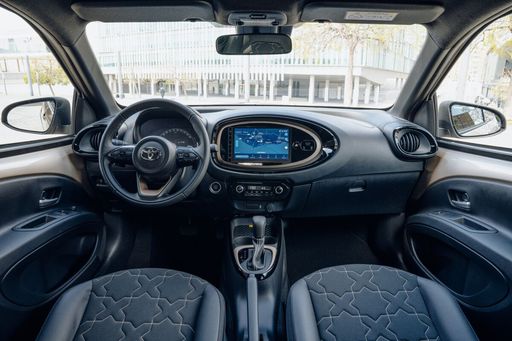 @ Toyota
@ Toyota
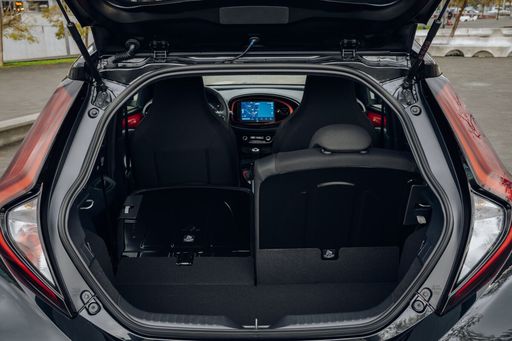 @ Toyota
@ Toyota

|

|
|
|
|
Costs and Consumption |
|
|---|---|
|
Price
about 27300 - 38800
$
|
Price
about 16200 - 22100
$
|
|
Consumption L/100km
-
|
Consumption L/100km
4.8 - 4.9
L
|
|
Consumption kWh/100km
13 - 14.7
kWh
|
Consumption kWh/100km
-
|
|
Electric Range
190 - 321
km
|
Electric Range
-
|
|
Battery Capacity
21.3 - 37.3
kWh
|
Battery Capacity
-
|
|
co2
0
g/km
|
co2
108 - 112
g/km
|
|
Fuel tank capacity
-
|
Fuel tank capacity
35
L
|
Dimensions and Body |
|
|
Body Type
Hatchback
|
Body Type
SUV
|
|
Seats
4
|
Seats
4
|
|
Doors
3 - 4
|
Doors
5
|
|
Curb weight
1330 - 1475
kg
|
Curb weight
1015
kg
|
|
Trunk capacity
185
L
|
Trunk capacity
231
L
|
|
Length
3632
mm
|
Length
3700
mm
|
|
Width
1683
mm
|
Width
1740
mm
|
|
Height
1527
mm
|
Height
1510
mm
|
|
Payload
250 - 305
kg
|
Payload
345
kg
|
Engine and Performance |
|
|
Engine Type
Electric
|
Engine Type
Petrol
|
|
Transmission
Automatic
|
Transmission
Manuel, Automatic
|
|
Transmission Detail
Reduction Gearbox
|
Transmission Detail
Manual Gearbox, CVT
|
|
Drive Type
Front-Wheel Drive
|
Drive Type
Front-Wheel Drive
|
|
Power HP
95 - 118
HP
|
Power HP
72
HP
|
|
Acceleration 0-100km/h
9 - 9.5
s
|
Acceleration 0-100km/h
15.5 - 15.6
s
|
|
Max Speed
135 - 150
km/h
|
Max Speed
151 - 158
km/h
|
|
Torque
220
Nm
|
Torque
93
Nm
|
|
Number of Cylinders
-
|
Number of Cylinders
3
|
|
Power kW
70 - 87
kW
|
Power kW
53
kW
|
|
Engine capacity
-
|
Engine capacity
998
cm3
|
|
Top speed
135 - 150
km/h
|
Top speed
151 - 158
km/h
|
General |
|
|
Model Year
2023 - 2024
|
Model Year
2022 - 2024
|
|
CO2 Efficiency Class
A
|
CO2 Efficiency Class
C
|
|
Brand
Fiat
|
Brand
Toyota
|
Fiat 500
The Timeless Charm: Introducing the Fiat 500
The Fiat 500 has long been a symbol of Italian style and urban practicality. As we navigate a new era in automotive history, the Fiat 500 continues to adapt and remains a much-loved vehicle worldwide. Let’s delve into the latest technical details and innovations that make this car a modern classic.
Electric Heartbeat: The Engines and Performance
The latest Fiat 500 models are powered entirely by electricity, showcasing a commitment to sustainable mobility without sacrificing performance. Under the stylish bonnet lies a choice between two power outputs, starting from a lively 70 kW (95 PS) to an energetic 87 kW (118 PS). This range of electric motors ensures that whether you’re navigating narrow city streets or cruising along open roads, the Fiat 500 delivers engaging performance with zero emissions.
Efficiency Meets Innovation: Energy Consumption and Range
Efficiency is at the forefront of the Fiat 500’s design. With energy consumption figures as low as 13 to 14.7 kWh/100km, the car balances power and performance efficiently. Electric range varies across the models, from 190 km for those designed for short urban commutes to an impressive 321 km for longer journeys. The innovative lithium-ion battery options—spanning 23.8 kWh to 42 kWh—are neatly integrated to maintain the car’s compact dimensions.
Technological Marvel: Smart Features and Design
The Fiat 500 is adorned with advanced features that enhance convenience and safety. It comes with an intuitive infotainment system that includes smartphone connectivity, navigation, and various driver assistance technologies, ensuring a seamless driving experience. The “La Prima” equipment line offers premium materials and a luxurious feel inside the cabin, making every journey comfortable and enjoyable.
Urban Flexibility: Compact Dimensions and Practicality
Designed for urban environments, the Fiat 500’s dimensions make it ideally suited for city dwellers. With a length of 3632 mm, width of 1683 mm, and height of 1527 mm, it’s easy to navigate through traffic and park in tight spaces. Despite its compact size, the Fiat 500 provides a practical boot capacity of 185 litres, perfect for daily errands or a weekend getaway.
Commitment to the Environment: Sustainability Focus
The Fiat 500 exemplifies a dedication to eco-friendliness with its CO2 emissions at zero, earning it an A in CO2 efficiency class. By choosing this vehicle, drivers are contributing towards a future with reduced automotive pollution, supporting cleaner air and healthier urban living.
Conclusion: The Future of Urban Driving
The Fiat 500 perfectly blends timeless style with modern electric innovations, setting a precedent for future city cars. Whether you prioritise aesthetic design, sustainable driving, or a premium driving experience, the Fiat 500 is designed to exceed expectations and redefine urban transportation.
Toyota Aygo
The Urban Maverick: Exploring the Toyota Aygo
The Toyota Aygo has long been a favourite for city dwellers and those who appreciate a compact yet stylish vehicle. With its latest iterations, the Aygo promises to deliver a blend of efficiency, modernity, and cutting-edge technology. Let's take a closer look at what this impressive vehicle has to offer.
Under the Bonnet: Technical Specifications
At the heart of the Toyota Aygo is a 1.0-litre three-cylinder engine. This petrol-powered engine is capable of producing 72 PS (53 kW) and offers a maximum torque of 93 Nm. The efficient engine achieves a fuel consumption of just 4.8 to 4.9 L/100km, making it an economical choice for urban commuting. The car features a front-wheel-drive layout and is available with either a manual transmission or a CVT automatic gearbox, providing flexibility for various driving preferences.
Performance on the Road
Despite its compact size, the Toyota Aygo offers a respectable acceleration from 0 to 100 km/h in just 15.5 to 15.6 seconds, with a top speed ranging between 151 and 158 km/h. This makes it well-suited for both city driving and highway cruising. The car's lightweight design of 1,015 kg ensures nimble handling and manoeuvrability in tight urban environments.
Design and Dimensions
The Aygo's contemporary exterior design is both attractive and functional. It measures 3,700 mm in length, 1,740 mm in width, and 1,510 mm in height, offering a compact footprint without sacrificing interior space. With five doors and four seats, the Aygo is practical for everyday use. The vehicle provides a boot space of 231 litres, ensuring you have enough room for groceries and luggage on the go.
Innovation and Features
The Toyota Aygo is equipped with a range of innovative features, enhancing the driving experience. Available in several trim levels including Business Edition, Explore, and Style, each comes with its own unique set of features. Standard offerings across trims include advanced safety features, a modern infotainment system, and optional extras such as climate control and advanced connectivity options.
Environmental Considerations and Efficiency
In line with environmental consciousness, the Toyota Aygo carries a CO2 efficiency class of C, with emissions ranging from 108 to 112 g/km. This ensures that the vehicle not only provides an efficient driving experience but also minimises its environmental impact. Additionally, the running costs are attractive, with estimated costs per kilometre between 27.4 and 31.3 cents, and monthly costs ranging from €685 to €783.
Pricing and Market Appeal
The Toyota Aygo is positioned competitively within the market, with pricing starting from €17,550 and reaching up to €23,950, depending on the selected trim and options. Its affordability, combined with its efficient performance and modern features, makes it an appealing choice for a wide range of buyers, particularly those seeking a reliable and economical vehicle for urban environments.
In conclusion, the Toyota Aygo stands out as a versatile and stylish city car that combines practicality with a touch of sophistication. Whether you're navigating busy urban streets or cruising on the motorway, the Aygo is well-equipped to handle the journey with ease and efficiency.
